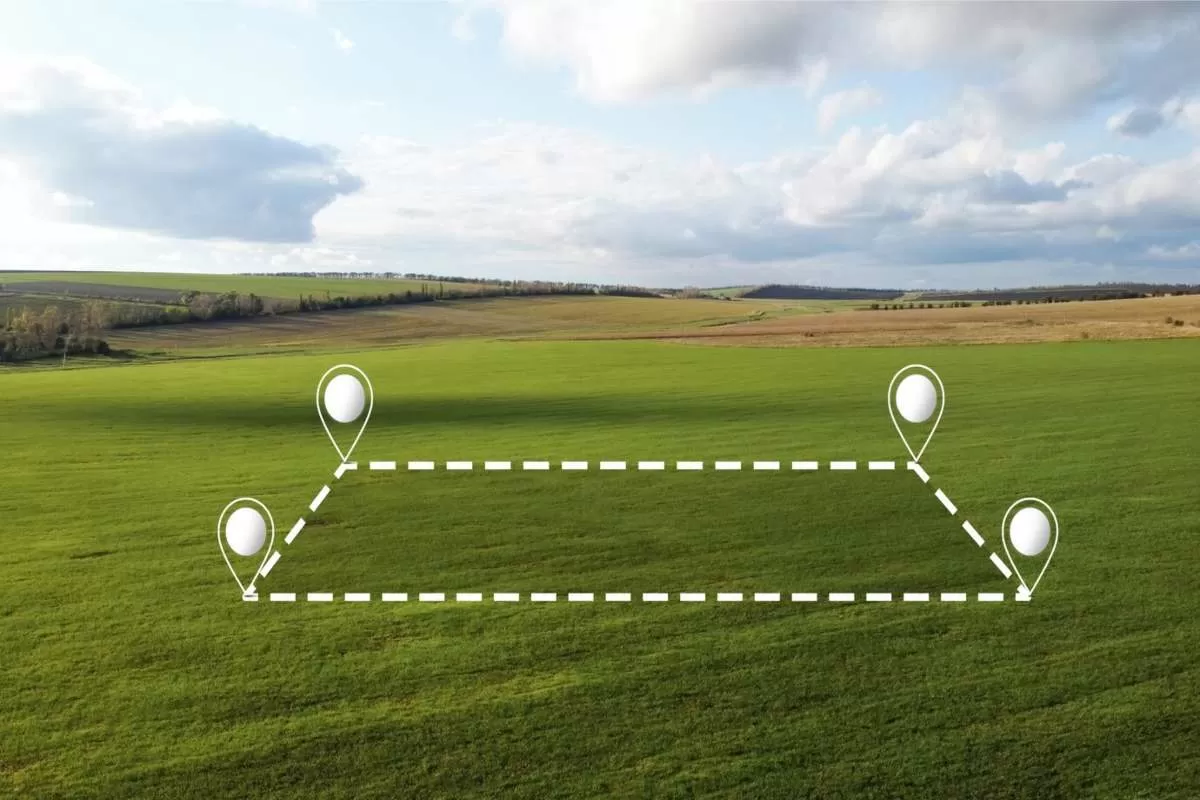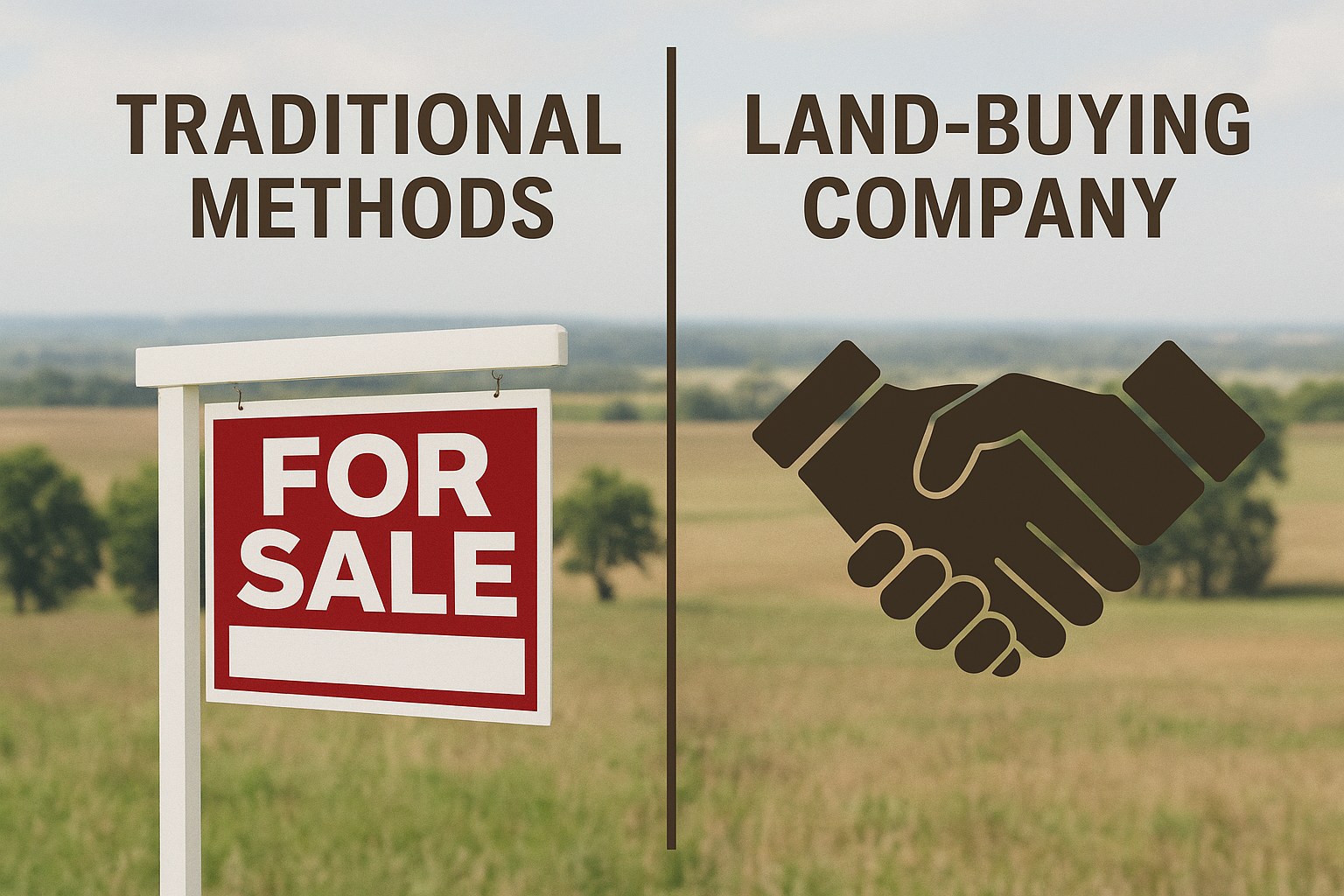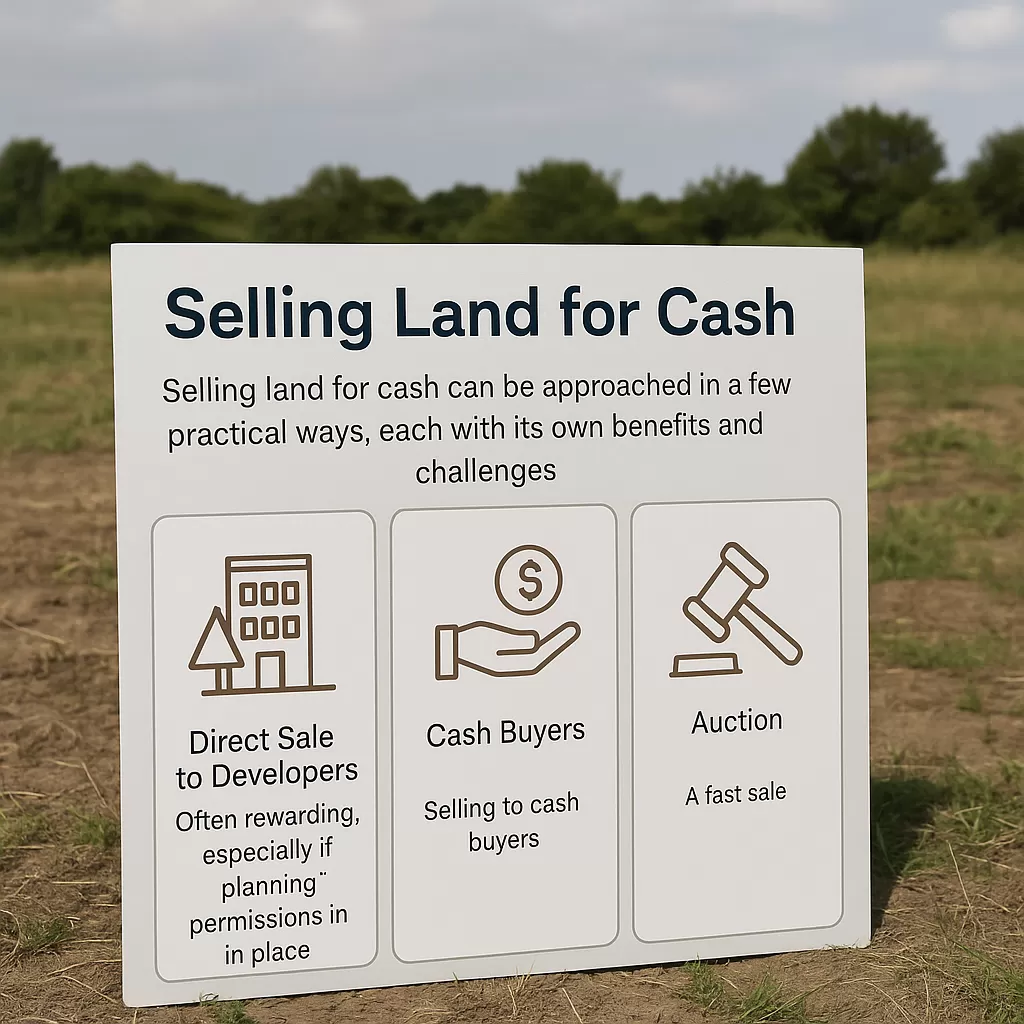Landowners can choose traditional marketing methods to sell, or you specialised land-buying companies when selling land. Each approach offers distinct advantages and considerations, with significant timeline, price, convenience, and certainty implications. Understanding these distinctions is crucial for making an informed decision aligned with your priorities and circumstances. This comprehensive guide thoroughly explores both pathways, providing landowners with the insights needed to select the most appropriate strategy.
Traditional Land Marketing Approach
The conventional route involves professional marketing to find buyers on the open market.
The Traditional Marketing Process
Understanding the standard sales journey:
- Agent appointment: Selecting professional representation for your land
- Valuation and pricing: Determining the appropriate asking price
- Marketing preparation: Creating promotional materials and documentation
- Active marketing period: Advertising and showing the property to prospects
- Offer negotiation: Discussing terms with interested parties
- Due diligence period: Buyer’s investigation of the property
- Contract exchange: Legally committing to the transaction
- Completion: Finalizing the sale and transferring ownership
This process typically takes 3-12+ months for land, significantly longer than residential property sales.
Marketing Methods and Channels
How land is traditionally promoted:
- Property portals: Online listing platforms like Rightmove and Zoopla
- Specialized land websites: Platforms explicitly focused on land sales
- Agent websites: Promotion through the agent’s online presence
- Signage: Physical “For Sale” signs at the property
- Print advertising: Newspaper and magazine placements
- Direct mail: Targeted information to potential buyers
- Email marketing: Distribution to the agent’s contact database
- Social media promotion: Digital campaigns on various platforms
Effective marketing requires presence across multiple channels to reach different buyer types.
Professional Representation Options
Types of agents for land sales:
- General estate agents: Mainstream property firms with broad focus
- Agricultural land agents: Specialists in farm and rural property
- Commercial agents: Firms focusing on business and development property
- Auction houses: Companies specializing in competitive bidding sales
- Planning consultants: Professionals combining planning and sales expertise
- Hybrid agents: Online-focused companies with reduced service models
- Multi-agent approach: Using several firms simultaneously
- Private sale option: Owner-managed marketing without professional representation.
The proper representation depends on land type, location, and potential use.
Cost Structure Analysis
Understanding traditional marketing expenses:
- Agent commission: Typically 1-3% of the sale price for land (higher than residential)
- Marketing material costs: Professional photography, brochures, and signage
- Advertising expenses: Paid promotion across various channels
- Legal fees: Solicitor costs for transaction management
- Continued ownership costs: Ongoing maintenance, security, and liability
- Tax implications: Potential capital gains liability timing
- Opportunity cost: Value of funds tied up during the marketing period
- Price negotiation impact: Typical discount from the asking price
These costs must be considered alongside the potential price premium of traditional marketing.
Direct Sale to Land Buying Companies
An alternative approach involves selling directly to specialized purchasers.
The Direct Sale Process
Understanding the streamlined journey:
- Initial inquiry: Contacting specialized land-buying companies
- Preliminary assessment: Receiving indicative offer based on initial information
- Site visit: Professional inspection of the property
- Formal offer presentation: Receiving comprehensive purchase proposal
- Documentation review: Brief verification of land details and title
- Contract exchange: Legally committing to the transaction
- Completion: Finalizing the sale and transferring ownership
This process is typically completed in 2-4 weeks compared to months or years through traditional methods.
Types of Direct Buyers
Different companies serving the direct purchase market:
- Development-focused buyers: Companies seeking land for construction
- Land banking companies: Firms acquiring for long-term appreciation
- Land trading specialists: Businesses that improve and resell land
- Institutional land purchasers: Large organizations with land portfolios
- Infrastructure developers: Companies acquiring for specific projects
- Agricultural consolidators: Businesses expanding farming operations
- Specialized land buyers: Companies like The Property Buyers focusing on direct land acquisition
- Private land investors: Individuals with particular acquisition criteria
Different buyer types offer varying advantages depending on your land characteristics.
Valuation Approach Differences

How direct buyers determine purchase prices:
- Market value assessment: Professional evaluation of current worth
- Development potential calculation: Assessment of future use value
- Risk discount application: Adjustment for planning and market uncertainties
- Timeline acceleration premium: Value added for immediate completion
- Cost-saving consideration: Adjustment for avoided marketing expenses
- Certainty factor inclusion: Premium for guaranteed completion
- Condition acceptance value: Worth purchasing without improvement requirements
- Complexity resolution premium: Value of addressing title or access issues
Direct buyers typically offer 70-90% of potential open market value in exchange for speed, certainty, and simplicity.
Service Elements Included
Additional benefits beyond the purchase itself:
- Legal fee coverage: Many direct buyers pay seller’s legal costs
- No agent commission: Elimination of traditional marketing fees
- Flexible completion timing: Ability to align with seller’s preferred schedule
- Problem resolution: Solutions for title, boundary, or planning issues
- Continued occupation options: Potential for sale and rent back arrangements
- Discretion and privacy: Confidential transactions without public marketing
- Simplified documentation: Streamlined paperwork requirements
Single point of contact: Dedicated representative throughout the process. These service elements add value beyond the headline purchase price.
Comparative Analysis of Both Approaches
Evaluating key factors that influence the decision between methods.
Timeline Comparison
Speed differences between approaches:
- Traditional marketing duration: Typically 3-12+ months from listing to completion
- Direct sale timeframe: Usually 2-4 weeks from inquiry to completion
- Marketing preparation period: Several weeks for traditional approach vs. immediate start for direct sale
- Viewing process length: Extended showing period vs. single assessment visit
- Negotiation timeline: Potentially lengthy discussions vs. straightforward offer
- Due diligence duration: Comprehensive buyer investigation vs. streamlined verification
- Financing delay risk: Potential mortgage complications vs. cash purchase certainty
- Completion flexibility: Limited vs. highly adaptable to seller needs
Timeline considerations are crucial for sellers with specific deadlines or urgent requirements.
Price Outcome Analysis
Understanding the financial implications:
- Maximum price potential: Traditional marketing offers the highest theoretical price
- Certainty of achievement: Direct sale provides guaranteed completion
- Net proceeds comparison: Price minus all costs and expenses
- Time value adjustment: Present value of faster payment vs. higher but delayed amount
- Price reduction risk: Potential for declining offers in traditional marketing
- Negotiation outcome variability: Unpredictable results vs. clear upfront offer
- Continued holding cost impact: Expenses during the extended marketing period
- Failed sale financial consequences: Abortive costs and market perception damage
The price differential between approaches varies significantly based on land type, location, and market conditions.
Convenience Factor Evaluation
Assessing the practical experience differences:
- Seller involvement level: Significant ongoing participation vs. minimal requirements
- Property preparation needs: Presentation improvements vs. as-is purchase
- Viewing management: Coordinating multiple visits vs. single assessment
- Documentation burden: Comprehensive information package vs. basic requirements
- Query response demands: Extensive buyer questions vs. focused verification
- Meeting attendance requirements: Multiple consultations vs. limited interaction
- Transaction management responsibility: Significant oversight vs. guided process
- Post-sale obligations: Potential ongoing liability vs. clean break
Convenience considerations are crucial for remote owners, busy individuals, or those with limited capacity.
Certainty Comparison
Evaluating completion probability differences:
- Sale failure rate: 25-40% of traditional land sales vs. <5% for direct purchases
- Financing fall-through risk: Significant for traditional buyers vs. minimal for cash purchasers
- Survey impact potential: Possible renegotiation trigger vs. as-is acceptance
- Legal issue derailment risk: Potential deal-breaker vs. problem-solving approach
- Market condition vulnerability: Exposure to changing sentiment vs. committed buyer
- Buyer commitment level: Limited vs. professional acquisition focus
- Chain dependency: Potential reliance on other transactions vs. standalone purchase
- Completion timing certainty: Variable vs. highly predictable
Certainty is particularly valuable for sellers with dependent plans or financial commitments.
Decision Factors for Landowners
Key considerations when choosing between approaches.
Seller Circumstance Assessment
How personal situations influence the optimal approach:
- Timeline requirements: Urgency level and completion date needs
- Financial position: Necessity for maximum price vs. certainty of outcome
- Geographic proximity: Ability to manage a traditional sale process
- Property knowledge: Familiarity with land details and history
- Market understanding: Awareness of current conditions and trends
- Risk tolerance: Comfort with uncertain outcomes and timelines
- Ongoing liability capacity: Ability to maintain responsibility during marketing
- Following step dependencies: Reliance on sale completion for subsequent plans
Personal circumstances often outweigh purely financial considerations when determining the best approach.
Property Characteristic Influence
How land features affect method suitability:
- Development potential clarity: Clear opportunities vs. uncertain possibilities
- Access quality: Established routes vs. complicated rights of way
- Title complexity: Clean ownership vs. complicated legal situation
- Planning status: Existing permission vs. speculative potential
- Size and value: Higher-value land may justify longer traditional marketing
- Location desirability: Prime areas perform better in open marketing
- Unique feature presence: Distinctive benefits that attract premium buyers
- Problem issue existence: Complications that specialized buyers handle better
Certain property types naturally align better with specific selling approaches.
Market Condition Considerations
How external factors affect method selection:
- Current demand level: Strong seller’s market vs. limited buyer interest
- Comparable sale evidence: Recent similar transactions vs. valuation uncertainty
- Interest rate environment: Financing cost impact on buyer capability
- Economic outlook: Growth expectations vs. recession concerns
- Seasonal timing: Optimal vs. suboptimal marketing periods
- Planning policy context: Supportive vs. restrictive development environment
- Competitive inventory levels: Limited vs. abundant alternative properties
- Buyer sentiment trends: Improving vs. deteriorating confidence
Market conditions significantly impact the potential premium available through traditional marketing.
Hybrid Approach Possibilities
Combining elements of both methods:
- Time-limited traditional marketing: Setting a defined period before direct sale
- Parallel path pursuit: Simultaneously exploring both options
- Direct buyer backup arrangement: Securing fallback while attempting a conventional sale
- Pre-marketing direct offer benchmark: Establishing minimum acceptable outcome
- Auction with reserve based on direct offer: Competitive bidding with a safety net
- Targeted off-market approach: Limited marketing to select buyers before wider exposure
- Direct sale with overage: Immediate purchase with share in future value increases
- Agent-negotiated direct sale: Professional representation for direct buyer transactions
Creative combinations can capture benefits from both approaches in certain situations.
Working with Specialized Land Buyers

For landowners considering the direct sale route, understanding the process is essential.
Identifying Reputable Direct Buyers
Evaluating potential purchasing companies:
- Established track record: History of successful land acquisitions
- Financial capacity verification: Evidence of purchase capability
- Testimonial and review assessment: Feedback from previous sellers
- Industry association membership: Professional organization affiliation
- Transaction process transparency: Clear explanation of how sales work
- Team expertise evaluation: Professional qualifications and experience
- Communication quality assessment: Responsiveness and clarity
- Ethical approach verification: Honest, straightforward dealings
Choosing reputable buyers ensures a positive direct sale experience.
The Initial Consultation Process
What to expect when first engaging:
- Information requirements: Property details needed for assessment
- Valuation methodology explanation: How the offer will be determined
- Timeline clarification: Expected process duration and milestones
- Documentation needs overview: Papers required for verification
- Question opportunity provision: Chance to address any concerns
- Obligation clarification: Understanding the commitment level at each stage
- Next steps explanation: Clear path forward after initial discussion
- Decision timeframe establishment: How long will the offer remain valid
The initial consultation should provide complete clarity without pressure.
Offer Evaluation Guidance
Assessing direct purchase proposals effectively:
- Market value comparison: How the offer relates to potential open market value
- Net proceeds calculation: Determining actual financial outcome after all costs
- Timeline benefit quantification: Valuing the speed advantage
- Certainty premium assessment: Worth of guaranteed completion
- Condition acceptance value: Benefit of as-is purchase without improvements
- Problem resolution worth: Value of addressing complicated issues
- Service element inclusion: Additional benefits beyond the purchase price
- Alternative option comparison: Realistic assessment of other approaches
The comprehensive evaluation considers all factors beyond just the headline price.
Completion Process Overview
Understanding the final transaction stages:
- Legal representation arrangement: Solicitor appointment and coordination
- Documentation preparation: Assembling necessary paperwork
- Title verification process: Confirming ownership and boundaries
- Query resolution approach: Addressing any questions efficiently
- Contract exchange timing: When legal commitment occurs
- Completion date coordination: Aligning final transfer with seller needs
- Fund transfer mechanics: How payment is securely arranged
- Post-completion support: Assistance after sale conclusion
The completion process with specialized buyers is typically more streamlined than traditional transactions.
Conclusion
Landowners must make a fundamental decision about whether to sell land through traditional marketing or direct sale to land-buying companies. Each approach offers distinct advantages: traditional marketing provides the potential for maximum price achievement but with extended timelines and significant uncertainty, while direct sale delivers speed, certainty, and convenience, typically at a price discount.
For landowners seeking a balance of fair value and transaction simplicity, specialized land-buying companies offer a compelling alternative to traditional marketing approaches. These buyers combine land expertise with direct purchase capability, often completing transactions in weeks rather than months or years, regardless of property complications or market conditions.
The optimal approach depends on your circumstances, property characteristics, and priorities. By understanding the full implications of each option, you can make an educated decision aligned with your particular needs, whether that means pursuing maximum theoretical value through traditional marketing or accepting a fair offer with certainty through direct sales.









